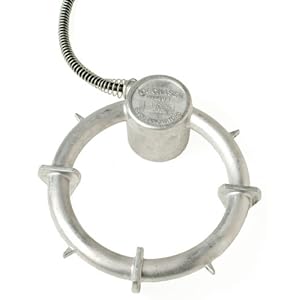I bought this deicer and it arrived today, just in time for sub-freezing temperatures tonight.

http://www.amazon.com/Farm-Innovato...1?ie=UTF8&s=home-garden&qid=1290481040&sr=8-1
The instructions say it that in a plastic bucket it needs to be grounded to a rod that is at least five feet underground. I'm no electrician, so I need some advice (in fact, I'm afraid to change the outlets in my house for fear of being electrocuted). I have a five gallon bucket with poultry nipple on the bottom. I suppose grounding is in case their is an electricity leak with the unit so the chickens don't get 250W right in the beak. Is it really necessary? Especially if it is in an outlet that is grounded? I also plan on using a 100 foot extension cord (only way to get it out to the coop). Probably a no-no, but can I get away with it? I wanted to install the unit tonight, but I don't have stuff on hand to ground it.
If it makes any difference, the extension cord is plugged into a grounded (three prong) outlet.
Thanks in advance for any sage advice.

http://www.amazon.com/Farm-Innovato...1?ie=UTF8&s=home-garden&qid=1290481040&sr=8-1
The instructions say it that in a plastic bucket it needs to be grounded to a rod that is at least five feet underground. I'm no electrician, so I need some advice (in fact, I'm afraid to change the outlets in my house for fear of being electrocuted). I have a five gallon bucket with poultry nipple on the bottom. I suppose grounding is in case their is an electricity leak with the unit so the chickens don't get 250W right in the beak. Is it really necessary? Especially if it is in an outlet that is grounded? I also plan on using a 100 foot extension cord (only way to get it out to the coop). Probably a no-no, but can I get away with it? I wanted to install the unit tonight, but I don't have stuff on hand to ground it.
If it makes any difference, the extension cord is plugged into a grounded (three prong) outlet.
Thanks in advance for any sage advice.
Last edited:




